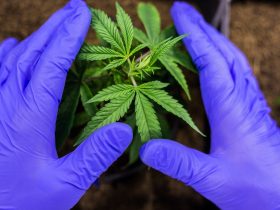We have heard about the benefits of fresh carrots since childhood, but other foods positively affect vision too. They will not only replace glasses, but they will help improve and maintain eye health. Before proceeding towards good food for eyesight, let’s have a look at foods and drink to avoid, improving eyesight.
- Margarine And Vegetable Oils: These processed oils contain chemicals that can make the vessels narrow. As a result, the vision of a person deteriorates. If you want to have good eye health, avoid these man-made oils.
- Fried Foods: These foods have high saturated fats, which can restrict blood vessels’ normal functioning. Therefore, it is better not to eat cookies, processed meat, and bacon.
- Alcohol: Excessive alcohol consumption causes dryness of the eyes that can even cause permanent loss of sight. You need to abandon this bad habit before it takes away your vision. You can look for a help center, for example, by searching drug rehab near me on the internet and visit the center nearest to your home for help.
- Sugar: The more you consume sugar, the worse your eyesight becomes. You have to abstain from using this white poison to secure your eye’s health.
What To Eat For Good Eyesight
The following foods are not only beneficial for your health but also promote good vision.
1. Fish
Fish found in cold waters contains omega-3 fatty acids. These fish prevent dry eyes and help reduce the risk of retinal degeneration and cataracts. Salmon, herring, sardines, and mackerel are among the useful sea fish. Moreover, fish oil is also effective for good eye health.
2. Parsley
100 grams of parsley contains 5561 mcg of lutein. It is a carotenoid that naturally absorbs excess sunlight and prevents plant damage. In the body, lutein works as an antioxidant and protects cells from free radicals’ harmful effects. Parsley juice is also healthy. You can drink it a teaspoon a day or add fresh herbs to ready-made meals.
3. Spinach
Spinach contains a record 12,198 mcg of lutein per 100 grams of the product. It also contains the lutein isomer zeaxanthin, which reduces the risk of age-related macular degeneration leading to blurred vision. Many researchers have confirmed this fact about spinach.
4. Eggs
Eggs are rich in vitamin A (retinol) and lutein. Vitamin A is involved in the creation of visual pigments that transmit the visual signal. These are light-sensitive substances, the concentration of which decreases in light and is restored in the dark. The opsin protein in the retina’s photosensitive cells helps in the conversion of light into an electrochemical signal.
Retinol is also essential in the synthesis of rhodopsin. It is responsible for twilight vision – the ability to see in low light conditions.
5. Bright Vegetables And Fruits
Sweet bell peppers, pumpkin, corn, beets, apricots, and melon are good for vision. All of them are sources of vitamins A and C, as well as beta-carotene. This antioxidant strengthens the immune system, accelerates tissue repair and healing. Try to choose seasonal fruits and vegetables that are higher in nutrients and lower in chemicals and preservatives.
6. Citrus And Berries
Oranges, lemons, grapefruits, and berries contain a lot of vitamin C. Rose hips, sea buckthorn, red mountain ash, strawberries, and black currants are especially rich in them. Vitamin C promotes cholinesterase formation, an enzyme that breaks down choline esters and lowers eye pressure.
The antioxidant properties of vitamins help reduce the risk of eye cataracts. In combination with carotenoids, vitamin C excludes the development of retinal diseases. Moreover, it performs a therapeutic function for vision.
7. Whole Grains
Carbohydrates with a low glycemic index get absorbed more slowly, so they do not cause sudden spikes in blood sugar. Eating low-GI whole grain cereals and bread has a therapeutic effect. It reduces the possibility of age-related macular degeneration.
This is a hereditary disease: scientists from American research centers claim that the Complement Factor H gene mutation is responsible for it. Nevertheless, proper nutrition can delay the onset of the disease and even completely eliminate it despite the predisposition. By the way, whole grains also contain vitamin E, zinc, and niacin, which help preserve vision.
8. Nuts
Nuts contain omega-3 and vitamin E. The latter is especially abundant in pine nuts (9.33 mg), hazelnuts (20.4 mg), almonds (24 mg), and walnuts contain up to 5.8 mg of vitamin C per 100 grams. Remember that this is a rich and high-calorie food. Although the WHO advises to include nuts and seeds in the daily diet, you should limit their intake to 30 grams per day.
9. Animal Liver
This offal contains a lot of vitamin A. For example, turkey liver contains 8000 mcg of retinol per 100 grams, beef and pork liver – about 6500 mcg, and chicken liver – 3300 mcg. Cod liver oil has a record 30,000 mcg vitamin A content. This amount is more than three thousand percent of the daily value.
The liver contains vitamins A, B, D, E, and K, as well as calcium, iron, chromium, zinc, and heparin. The latter reduces the risk of developing blood clots and improves blood clotting. Synthesized heparin is present in eye drops to moisturize, protect the cornea, and eliminate irritation.
The retina is the main storage reservoir for retinol. Keep in mind that vitamin A accumulates in the body. And this can cause liver disease, headaches, hyperemia, and night blindness.
10. Legumes
Beans, peas (including chickpeas), and lentils are sources of bioflavonoids and zinc. These help to protect the retina and lower the risk of macular degeneration and cataracts. Zinc contributes to the normal functioning of the retina and maintains the transparency of the eye lens.
It also accelerates the absorption of vitamin A. However, it is better not to consume more than 100 mg of zinc per day. A larger amount can negatively affect the body’s immune system.
Tips To Get Good Eyesight
Conclusion
Eyes like the rest of the body require special care. To restore and improve eyesight, the foods mentioned above can help. However, also be cautious of harmful foods that deteriorate your vision. Stay Healthy!







